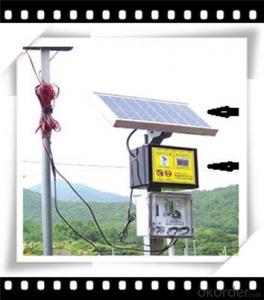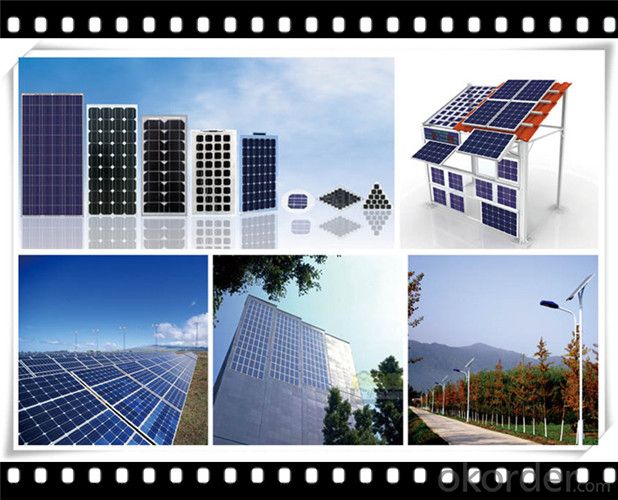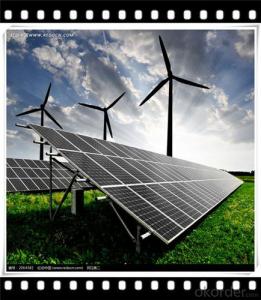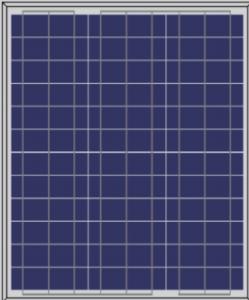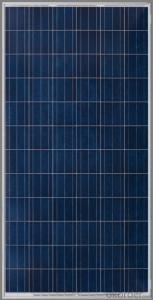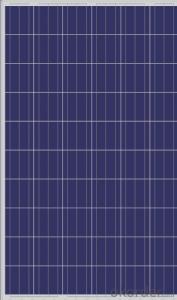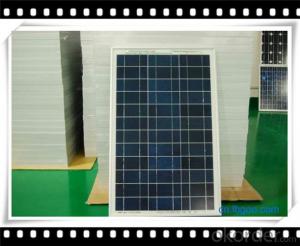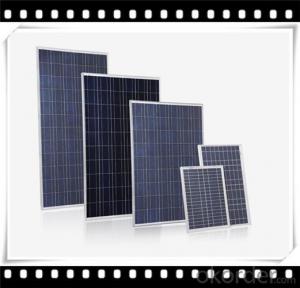400 Watt Bifacial Solar Panels - 250W Poly Solar Panel Medium - CNBM Solar Panel Manufacturer in China
- Loading Port:
- Qingdao
- Payment Terms:
- TT OR LC
- Min Order Qty:
- 10 set
- Supply Capability:
- 300000 set/month
OKorder Service Pledge
OKorder Financial Service
You Might Also Like
Polycrystalline Solar Modules
CNBM offers a range of small, medium and large polycrystalline solar modules, designed for a range of requirements.
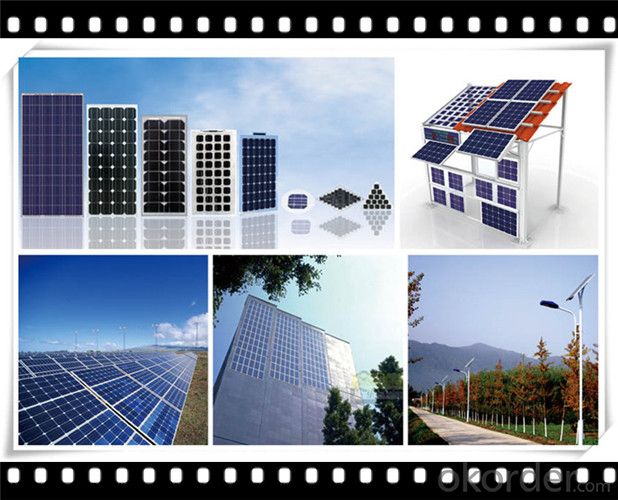
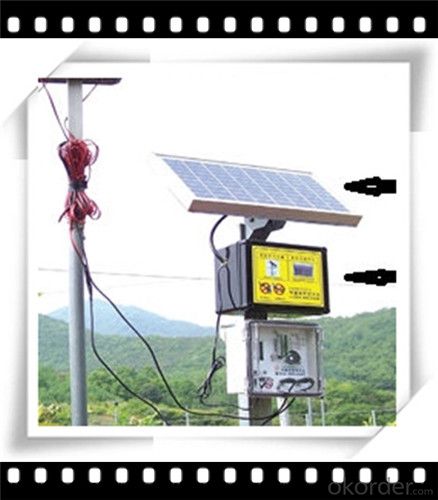
Specifications:
+/-3% |
Polycrystalline silicon solar cells (156 x 156mm) |
60 (10 x 6) |
1650 x 990 x 40 |
25.5 |
Limits:
Operating Temperature | -40~+85? |
Storage Temperature | -40~+85? |
Maximum System Voltage | 1000 VDC max. |
Hail Impact | Diameter of 28mm with impact speed |
Temperature and Coefficients:
NOCT | 48C+/-2? |
Voltage temperature coefficient (%/K) | -0.35 |
Current temperature coefficient (%/K) | 0.05 |
Power temperature coefficient (%/K) | -0.45 |
Characteristics:
Model: | SGM-200P | SGM-210P | SGM-220P |
Max-power voltage Vmp (V) | 29.2 | 29.4 | 29.41 |
Max-power current Imp (A) | 6.85 | 7.14 | 7.48 |
Open-circuit voltage Voc (V) | 36.5 | 36.69 | 36.9 |
Short-Circuit Current Isc (A) | 7.28 | 7.6 | 7.93 |
Max-power Pm(W) | 200 | 210 | 220 |
Model: | SGM-230P |
Max-power voltage Vmp (V) | 29.8 |
Max-power current Imp (A) | 7.72 |
Open-circuit voltage Voc (V) | 37.31 |
Short-Circuit Current Isc (A) | 8.19 |
Max-power Pm(W) | 230 |
STC: Irradiance 1000W/m2, module temperature 25?, AM-=1.5
Poly Crystalline Solar Panels Specifications Range
Maximum Power (Pm) | Dimension | Weight | Operating Voltage (Vmp) | Operating Current (Imp) | Open Circuit Voltage (Voc) | Short Circuit Current (Isc) |
0.45W | 140x80x10mm | 0.08kg | 3.3V | 150mA | 4.6V | 160mA |
1.0W | 162x140x10mm | 0.16kg | 7.5V | 150mA | 10.3V | 160mA |
4.5W | 269x251x23mm | 0.8kg | 16.5V | 0.27A | 20.5V | 0.3A |
10W | 420.1×268.9×22.6mm | 1.92kg | 17.5V | 0.58A | 20.5V | 0.6A |
20W | 425x502x50mm | 3.0kg | 16.8V | 1.19A | 21.0V | 1.29A |
30W | 593x502x22.6mm | 3.9kg | 16.8V | 1.78A | 21.0V | 1.94A |
40W | 655x537x50mm | 5.75kg | 17.3V | 2.31A | 22.1V | 2.54A |
50W | 839x537x50mm | 6.0kg | 17.5V | 2.9A | 21.8V | 3.17A |
65W | 1111x502x50mm | 7.2kg | 17.6V | 3.69A | 22.1V | 3.99A |
80W | 1204x537x50mm | 7.7kg | 17.6V | 4.55A | 22.1V | 4.8A |
- Q: I have two solar panels that were going to be trashed at work. I want to use them to charge batteries on my RV but i noticed they put out around 20 volts in direct sunlight. So i am wondering: -isn't this way too much voltage for a 2 volt system? -do a need some sort of a regulator connected to keep them from overcharging?
- You okorder /
- Q: Can solar panels be installed on a military vehicle or equipment?
- Yes, solar panels can be installed on military vehicles or equipment. In fact, many modern military vehicles are being equipped with solar panels to harness renewable energy for various purposes, such as powering communication systems, electronics, and auxiliary equipment. This helps reduce reliance on traditional fuel sources and increases the operational efficiency and sustainability of military operations.
- Q: Can solar panels be installed on commercial buildings?
- Yes, solar panels can be installed on commercial buildings. In fact, many businesses and organizations are increasingly opting for solar panel installations to generate clean and renewable energy, reduce energy costs, and demonstrate their commitment to sustainability.
- Q: Can solar panels be installed on concert venues or music festivals?
- Yes, solar panels can be installed on concert venues or music festivals. In fact, many event organizers are increasingly adopting solar energy to power their events, reducing their carbon footprint and promoting sustainability. Solar panels can be installed on rooftops, parking lots, or even as temporary structures to generate clean and renewable energy for the venue's electricity needs.
- Q: Can solar panels be used in areas with high levels of snow or ice?
- Yes, solar panels can be used in areas with high levels of snow or ice. However, their efficiency may be reduced during winter months due to reduced sunlight exposure and accumulation of snow or ice on the panels. To mitigate this, solar panels can be installed at an angle to allow snow to slide off, or they can be equipped with heating systems to melt the snow or ice. Additionally, regular maintenance and cleaning may be required to ensure optimal performance in snowy or icy conditions.
- Q: Can solar panels be used to power a sports car?
- Yes, solar panels can be used to power a sports car. By installing solar panels on the vehicle, the sun's energy can be harnessed and converted into electricity to charge the car's battery, potentially extending its range. This technology is still in development, but several concepts and prototypes have been created, showing the potential for solar-powered sports cars in the future.
- Q: Has anyone had roof problems caused by rooftop solar panels?
- Rooftop solar panels might cause all sorts of maintenance or poor installation problems but I rather doubt at this point if we can say that there is an issue with solar panels in general that will cause a problem with the roof. Rather solar panels tend to shade a roof on its most exposed side. Without solar panels southern facing roofs will wear out faster than northern facing roofs. Installed solar panels will tend to make the roof last longer.
- Q: Do I need some type of regulator when the batteries are fully charged.?? The Arco Panels voltage is approx 7VDC at 2.5 amps, Should I limited the voltage to 4VDC???. I would like to connect both panels to up to five batteries at one time...???
- You can buy Solar Charger Regulators. I don't. These chargers limit the charging current to the batteries, so you do not get a full efficiency of the solar panel. They disconnect the batteries from the user side (the bulbs you use) if the battery voltage goes below a certain level (i.e. below 8V for a 2V battery), so you cannot use all the power available in the batteries, even in emergency. They introduce, at least, a 0.7V loss (diode forward voltage) between the panel and the battery. If you have SEVERAL panels and a lot of batteries, use a controller as above. If you only have one panel, insert a 5A trip fuse in line (in your case: twice the current of the panel), and a 0-20A diode in series between the panel and the batteries (Kathode side of the + of the battery, Anode side of the + of the panel). Install a voltmeter across the battery. The fuse will prevent any short or over-charge current. The diode will prevent the battery to discharge into the panel at night if it is not already protected. The voltmeter will allow you to watch the status. Your thought of limiting the voltage is useless: should the battery be low, the panel will drop its voltage, limited by the max current. Should the battery be fully charged and the solar panel at full efficiency, it will just try to charge the battery more. A bit of bubbles may result, hence the voltmeter to watch over it. If you want to limit the voltage to 4V, put a 4V Zener (4Vx2.5W!) in series with a resistor of, say, 7V-4V/2.5A or ~ Ohm, 5W, in parallel with the panel.
- Q: I'm looking into buying solar panels, there are all kinds of ranges of energy output...but my question is, when ti says...say 50 watts of power...does that mean 50 watts a day, an hour, a minute, what?
- A 50-watt rating means the panel will produce 50 watts as long as the standard conditions are maintained. So if you had this bright sun and cool temperatures for 6 hours, the panel would deliver 50 x 6 = 900 watt hours, or a little shy of kilowatt-hour. Kilowatt-hours (kWh) is the reading on your electric bill. However, like most advertising, the 50-watt number is not realistic. They assume that the air surrounding the panel is very cold. 25 watts is a better number to use for this size of panel for engineering purposes.
- Q: My dad owns a restaurant, and we are doing farely well, but we were thinking on installing solar panels to minimize electricity costs (and of course make it greener). My dad would like to hear some numbers on the price in today (August 29/202) and savings he could possibly make over the years. So In Total Here's What I'm Asking:) Would it be hard to install?2) Maintanence?3) Monthly Expense? (None?)4) Price?5) Savings over time?6) Pros/ConsThank you so much!
- Different solar companies install these panels. Check your local area for a free quote. If you don't already have a solar panels for a hot water system yet, consider a thermosiphon design, then you need no electricity to produce hot water. All the other designs require some electricity.
Send your message to us
400 Watt Bifacial Solar Panels - 250W Poly Solar Panel Medium - CNBM Solar Panel Manufacturer in China
- Loading Port:
- Qingdao
- Payment Terms:
- TT OR LC
- Min Order Qty:
- 10 set
- Supply Capability:
- 300000 set/month
OKorder Service Pledge
OKorder Financial Service
Similar products
Hot products
Hot Searches
Related keywords
